| Sport | Ice hockey |
|---|---|
| Founded | 1922 |
| No. of teams | 18 (1922) |
| Country | Canada |
The Ladies Ontario Hockey Association (LOHA) was a women's ice hockey association in Ontario, Canada. It was founded in 1922, [1] but faded during the Great Depression, as ice time for women's teams became rare and the number of member teams significantly decreased.
In the early 1920s, working class women sought increased control over the administration and organizational aspects of the sports they played, including ice hockey. [2] On December 16, 1922, a meeting was held to announce the Ladies Ontario Hockey Association was formed. [1]
The organization was structured similarly to the Ontario Women's Softball Association in which women would run the organization but men would serve in an advisory capacity. During the December 16 meeting, Frank McEwen, president of the Toronto Hockey League, presided over the meeting. Members from ladies clubs in London, Ontario, and St. Thomas, Ontario, were present. There was a total of 20 teams in attendance. [3] A letter from the Ottawa Alerts ladies club was presented, indicating their interest to join. [1]
The women who become the executives of the LOHA in its first year were Mae Maxwell (First Vice President), Winnie Simpson (Second Vice President), Janet Allen (Treasurer), Kathleen Milne and E Harrison were members at large. John DeGruchy was its honorary president while Frank Best was its president. By December 23, 18 teams joined the LOHA and paid dues of eleven dollars for each team. [4] In its first year, the LOHA associated with the Ontario branch of the Amateur Athletic Union of Canada. [5] In 1923, Janet Allen was the first female to be elected LOHA president.
In autumn of 1923, the LOHA suffered a setback when the Canadian Amateur Hockey Association held a meeting in Port Arthur. The Association voted not to give women official recognition as hockey players. [5]
In 1927, LOHA president Janet Allen and LOHA treasurer Bobbie Rosenfeld attended the 38th meeting of the men's hockey association, the Ontario Hockey Association (OHA), and asked the OHA to help endorse the league. In the process, they announced that if the OHA would help boost its membership, the LOHA would create a provincial championship for its member teams. [6]
By 1934, the impact of the Great Depression was felt as the LOHA only had seven member teams, only one of which was from the city of Toronto. By late 1936, Bobbie Rosenfeld was not only the LOHA president, but served as the secretary and the treasurer. [7]
Due to the Great Depression, ice time became extremely rare, especially for women. In March 1938, the LOHA semi-final with the Preston Rivulettes and the Northern Marvels of Cobalt had to be rescheduled. The game was scheduled to be played in Preston, but the OHA forced a change in venue so that a men's game could be played. [8]
| Years | President |
| 1922-23 | Frank Best |
| 1923-27 | Janet Allen |
| 1927-34 | E Ruttier |
| 1934-39 | Bobbie Rosenfeld |
| 1939-40 | Roxy Atkins |

U Sports women's ice hockey is the highest level of play of women's ice hockey at the university level under the auspices of U Sports, Canada's governing body for university sports. Women's ice hockey has been played in U Sports since the 1997-98 season, when the governing body was known as the Canadian Interuniversity Athletics Union, following a long stint of teams only competing in the OUA. There are 35 teams, all of which are based in Canada, that are divided into four conferences that are eligible to compete for the year-end championship. As these players compete at the university level, they are obligated to follow the rule of standard eligibility of five years.

Fanny "Bobbie" Rosenfeld was a Canadian athlete, who won a gold medal for the 100-metre relay and a silver medal for the 100-metre at the 1928 Summer Olympics in Amsterdam. She was a star at basketball, hockey, softball, and tennis; and was called Bobbie for her "bobbed" haircut. In 1949, named Rosenfeld the "Canadian woman athlete of the half-century." The Bobbie Rosenfeld Award is named in her honour. In 1996, she was inducted into the Ontario Sports Hall of Fame.

The Ontario Hockey Association (OHA) is the governing body for the majority of junior and senior level ice hockey teams in the province of Ontario. Founded in 1890, the OHA is sanctioned by the Ontario Hockey Federation along with the Northern Ontario Hockey Association. Other Ontario sanctioning bodies along with the OHF include the Hockey Eastern Ontario and Hockey Northwestern Ontario. The OHA controls three tiers of junior hockey; the "Tier 2 Junior "A", Junior "B", Junior "C", and one senior hockey league, Allan Cup Hockey.
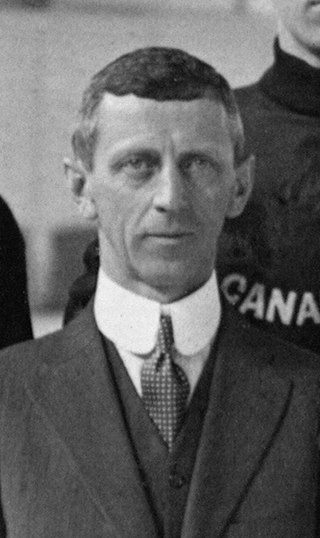
William Abraham Hewitt was a Canadian sports executive and journalist, also widely known as Billy Hewitt. He was secretary of the Ontario Hockey Association (OHA) from 1903 to 1966, and sports editor of the Toronto Daily Star from 1900 to 1931. He promoted the establishment of the Canadian Amateur Hockey Association (CAHA), then served as its secretary-treasurer from 1915 to 1919, registrar from 1921 to 1925, registrar-treasurer from 1925 to 1961, and a trustee of the Allan Cup and Memorial Cup. Hewitt standardized player registrations in Canada, was a committee member to discuss professional-amateur agreements with the National Hockey League, and negotiated working agreements with amateur hockey governing bodies in the United States. He oversaw referees within the OHA, and negotiated common rules of play for amateur and professional leagues as chairman of the CAHA rules committee. After retiring from journalism, he was the managing-director of Maple Leaf Gardens from 1931 to 1948, and chairman of the committee to select the inaugural members of the Hockey Hall of Fame in 1945.

George Samuel Dudley was a Canadian ice hockey administrator. He joined the Ontario Hockey Association (OHA) executive in 1928, served as its president from 1934 to 1936, and as its treasurer from 1936 to 1960. He was elected to Canadian Amateur Hockey Association (CAHA) executive in 1936, served as its president from 1940 to 1942, as its secretary from 1945 to 1947, and as its secretary-manager from 1947 to 1960. He was secretary of the International Ice Hockey Association from 1945 to 1947, and was later vice-president of the International Ice Hockey Federation (IIHF) from 1957 to 1960. He was expected to become the next president of the IIHF before his death. He graduated from Osgoode Hall Law School in 1917 then practiced law for 43 years as the town solicitor for Midland, Ontario.

The Toronto Varsity Blues men's ice hockey team is an ice hockey team operated by the Varsity Blues athletics program of the University of Toronto. They are members of the Ontario University Athletics conference and compete in U Sports. The Varsity Blues senior team won the Allan Cup in 1921 and 1927, and won the gold medal for Canada at the 1928 Winter Olympics. The team is based at Varsity Arena on the University downtown campus in Toronto, Ontario.

John Maxwell Roxburgh was a Canadian ice hockey administrator and politician. He organized minor ice hockey in his hometown of Simcoe, Ontario, co-founded the Ontario Juvenile Hockey Association in 1934, and the Ontario Minor Hockey Association in 1940. He served as president of the Ontario Hockey Association from 1950 to 1952, improved its finances to become profitable, and appointed Bill Hanley as a full-time manager to operate the association as a business. Roxburgh served as president of the Canadian Amateur Hockey Association from 1960 to 1962, arranged exhibition games between Canada and the Soviet Union amid an increased rivalry between the respective national teams, and pushed for the separation of politics and sport when the Cold War threatened to cancel the 1962 Ice Hockey World Championships. He was opposed to changes in the Olympic Oath and the international definition of amateurism, and later recommended the formation of a student-athlete team coached by Father David Bauer to become the Canada men's national ice hockey team.

The first instances of organized women's ice hockey in Canada date back to the 1890s when it was played at the university level. The Women's Hockey Association claims that the city of Ottawa, Ontario hosted the first game in 1891. In 1920, Lady Meredith, an avid sportswoman and wife of Sir Vincent Meredith of Montreal donated the Lady Meredith Cup to the Quebec Ladies' Hockey Association, said to be the first women's ice hockey trophy created for a competition in Canada. At the time women competed in ankle-length skirts.
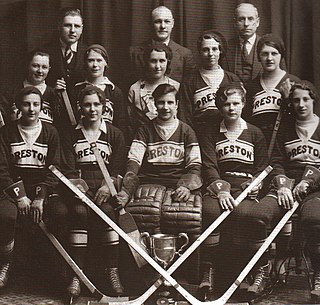
The Preston Rivulettes were a Canadian women's ice hockey team. They won four Dominion Championships and ten Ontario titles between 1931 and 1940. The team had a winning percentage of over 95%, a record unmatched in the history of women's hockey. They were inducted into the Cambridge Sports Hall of Fame on May 2, 1998, as members of the inaugural class of 1997. They were awarded the Order of Sport in 2022, marking their induction into Canada's Sports Hall of Fame.

The Toronto Varsity Blues women's ice hockey program represents the University of Toronto in the Ontario University Athletics conference of U Sports. Three-time Olympic medalist Vicky Sunohara has served as head coach since the 2011–12 season.
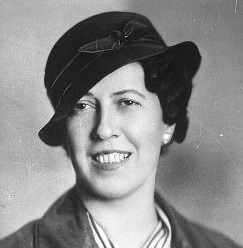
Alexandrine Gibb was a Canadian athlete and journalist, and a pioneer in women's sports. She created and managed the first international women's team. Gibb advocated for women's branches of sports across Canada and was involved in many women's organizations including the Canadian Ladies' Athletic Club which she inspired. She was a sports journalist for the Toronto Daily Star, where she wrote a daily column entitled "No Man's Land of Sport" and worked for over thirty years.

Eva Catherine Ault was a Canadian ice hockey player. Known as "Queen of the Ice", Ault is credited with helping to popularize women's ice hockey during the early 20th century.

Hilda Doris Ranscombe was a Canadian ice hockey player. She served for ten seasons as the Preston Rivulettes captain, and led the team to ten consecutive Ladies Ontario Hockey Association championships, five Eastern Canadian titles, and four national championships. She was considered one of the best female hockey players of her time, possessing natural speed and talent, that compared to players in the National Hockey League. Ranscombe was twice a finalist for the Lou Marsh Trophy, and twice inducted into Canada's Sports Hall of Fame–as an individual athlete in 2015, and as a member of the Rivulettes in 2022.

Lloyd Thompson Pollock was a Canadian ice hockey administrator and businessman. After running the Windsor City Hockey League, he assisted in the foundation of the Windsor Softball League, and later started a junior ice hockey league in Windsor, Ontario. He was a cofounder of the International Hockey League in 1945, and founder of the original Windsor Spitfires junior team in 1946. He served as president of the Ontario Hockey Association (OHA) from 1961 to 1963, welcomed the Montreal Junior Canadiens into the OHA when it was divided by the Metro Junior A League, and supported measures to preserve the Northern Ontario Hockey Association.

William Alexander Fry was a Canadian sports administrator and newspaper publisher. Fry founded the Dunnville Chronicle in 1896, managed local hockey and baseball teams in the 1910s, then served as president of the Ontario Hockey Association (OHA) from 1922 to 1924. At the national level, he was president of the Canadian Amateur Hockey Association (CAHA) from 1928 to 1930, was a Canadian Olympic Committee member and British Empire Games committee member from 1927 to 1938, and served as president of the Amateur Athletic Union of Canada from 1934 to 1936.
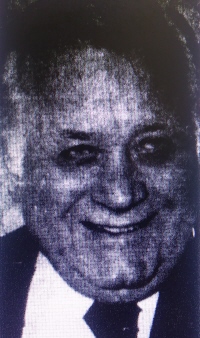
Clarence Vincent "Tubby" Schmalz was a Canadian ice hockey administrator. He served as vice-president of the Western Ontario Athletic Association from 1940 to 1950, and coached and managed the senior ice hockey team in Walkerton, Ontario. He was elected to the Ontario Hockey Association executive (OHA) in 1956, and served as its president from 1969 to 1972. He was the first commissioner of the Ontario Major Junior Hockey League (OMJHL), serving from 1974 to 1978. He became vice-chairman of the Canadian Amateur Hockey Association (CAHA) in 1979, and was elected its chairman in 1981. He was a graduate of St. Jerome's College, and operated the Hartley House hotel in Walkerton. He served on the Walkerton Town Council for 17 years, including three years as reeve from 1979 to 1981.

John Franklin Paxton was a Canadian ice hockey administrator. He served as president of the Ontario Hockey Association (OHA), and was the acting president of the Canadian Amateur Hockey Association during World War I. He ensured that competition for the Allan Cup continued, which saw increased participation from military teams playing senior ice hockey in Canada. He partnered with W. A. Hewitt to negotiate a relationship with the International Skating Union of America to resume hockey games between Canada and the United States that had ended due to the war. Paxton later served as treasurer of the OHA, was a regular delegate to the general meetings of the Amateur Athletic Union of Canada, and represented the old guard of strict principles of amateurism where hockey players did not accept money. He served as the sheriff of Ontario County from 1887 until 1932, and was the son of politician and industrialist Thomas Paxton. After Paxton's death, the Winnipeg Free Press referred to him as both "Canada's most beloved hockey official", and "hockey's most beloved figure".
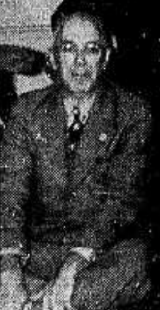
Harry John Sterling was a Canadian ice hockey administrator. He was elected president of the Canadian Amateur Hockey Association (CAHA) in 1920, after serving as an Ontario Hockey Association executive and as president of the Thunder Bay Amateur Hockey Association. He declared that the CAHA would not tolerate the hockey "tourist" after becoming suspicious of players who changed their addresses to be on a new team. His investigation into registrations led to the suspension of a team from Saskatoon when it was discovered that players who won the gold medal representing Canada in ice hockey at the 1920 Summer Olympics were being paid for amateur hockey. His term as president resulted in the CAHA enacting stricter rules for registration and co-operation with the Amateur Athletic Union of Canada to investigate into all Canadian hockey players to maintain amateurism.

Mary Dunn was a Canadian sports executive. She played on the Manitoba Bisons women's ice hockey team while in university, then became an executive with the Winnipeg Women's Senior Hockey League and the Manitoba Ladies' Hockey Association. She later served as vice-president, and then president of the Dominion Women's Amateur Hockey Association, where she arranged playoffs for the Canadian women's hockey championship. She was married to fellow sports executive Jimmy Dunn, and co-ordinated amateur sports for ladies as the vice-president then president of the Manitoba branch of the Women's Amateur Athletic Federation of Canada. She later served as president of the Winnipeg Community Chest, the Central Volunteer Bureau of Manitoba, and the Oriole Community Club in Winnipeg.
Brent Ladds is a Canadian former ice hockey administrator. He served as president of the Canadian Junior Hockey League (CJHL) from 2016 to 2022, president of the Ontario Hockey Association (OHA) from 1980 to 2012, commissioner of Allan Cup Hockey from 2013 to 2016, and chairman of the Hockey Canada junior hockey council from 2014 to 2016. He marketed the CJHL as a development program for players seeking a professional career or an education, with exposure to National Hockey League talent scouts at the annual CJHL Prospects Game and World Junior A Challenge. He also sought to increase marketing opportunities, have consistent administrative practices, and to co-ordinate public relations across the CJHL. His tenure as president also saw the withdrawal of the British Columbia Hockey League, and subsequent format change of the Centennial Cup tournament to include all nine league champions.